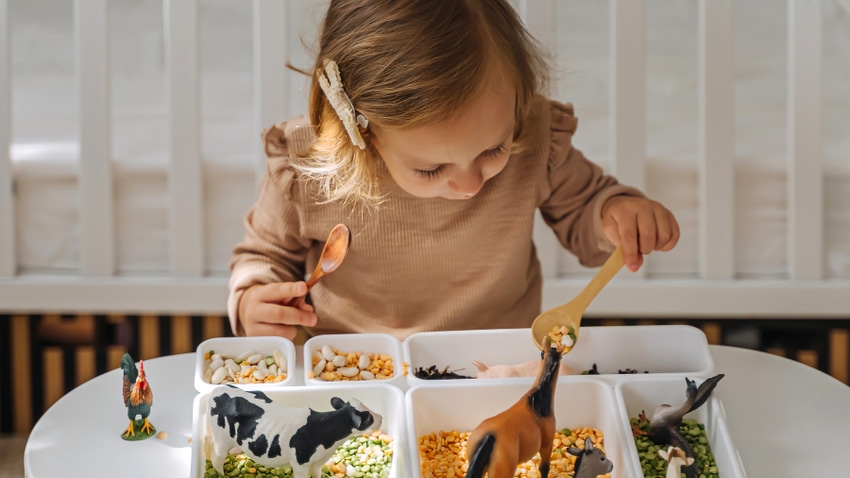
It was 1981, and already it was clear that U.S. children were growing up without the family roots in agriculture that previous generations had known. Families had moved to cities for economic opportunities, leaving the generational knowledge of where food comes from behind on abandoned farmsteads.
All those times where parents reinforced math lessons with chores that required calculating feed rations for a pen of hogs — not there. All the mornings naming the colors they could see on the prairie as they checked livestock — gone. All the little moments of practicing their reading and writing on feed sacks in the barn while they helped Dad with chores — poof.
What’s the harm, you ask? It’s not just that connection to their roots that is gone. Children who grow up thinking “farms” are what they read in an E.B. White book or what they see in movies and on television become adult voting consumers who base their decisions on myth and not facts.
And that’s why Agriculture in the Classroom is as important today as it was 40 years ago when it was created by a bipartisan task force and the USDA.
Ag in Classroom mission
Full disclosure: I’m on the board of directors for the Kansas Foundation for Agriculture in the Classroom, an affiliate of the National Agriculture in the Classroom organization. It’s someplace I believe can make a real difference in improving students’ (and, frankly, parents’ and teachers’ as well) “agricultural literacy.” If I didn’t believe in the mission, I wouldn’t be donating my time.
Some of you may be familiar with KFAC already. You may belong to one of the many Kansas farmer and commodity organizations that donate time and money to KFAC. You may have volunteered to speak to classes or taken a shift at Agriland at the Kansas State Fair. You might have used KFAC teaching materials and lessons in your classrooms. You might even sport a Kansas Agri-Tag license plate on your vehicle, supporting KFAC with a donation.
If you’ve ever had a chance to interact with KFAC in the past, I want to thank you. Your contributions, great and small, have made such a difference in the mission over the past 40 years.
But the mission continues.
Agricultural literacy
The goal of KFAC and other state Agriculture in the Classroom organizations is “agricultural literacy” in grades K-12. Now, 40 years ago that looked like coloring pages, farm field trips, and maybe a local farmer or farmwife coming to the classroom to show baby animals and plant sunflower seeds in plastic foam cups on Kansas Day. Those were — and still are — valid activities that are good for students to learn about and explore agriculture.
But those activities relied on some realities of the past.
For starters, farmwives had more time to volunteer in the schools back then. Today, many farm families don’t have a lot of time to spare for volunteer activities like their parents once had.
Second, teachers had more leeway in structuring their classes and lesson plans. Teachers also didn’t have so much turnover and could develop a familiarity with KFAC programs over time.
And, students back then were, shall we say, less sophisticated consumers of media? With the rise of digital tools in the classroom, and at home, KFAC has also had to evolve delivery methods for learning. For example, check out the Virtual Agriland at ksagclassroom.org/resource/agriland, with online resources for K-12 students and their teachers.
Today’s needs
The KFAC of today still uses experienced educators on our Curriculum Advisory Committee to ensure every resource it provides teachers meet state educational standards. It still relies on dedicated volunteers to help its small staff to provide materials and programming to schools. And it is still funded by donations from individuals, businesses and organizations that see the need for agricultural literacy in our youth.
But KFAC could always use your help.
Reach out to school districts and tell them about KFAC. Despite its 40-year reputation, some teachers may not have heard about the free resources KFAC provides. Visit the KFAC Education Center page, ksagclassroom.org/edu, to get started.
Volunteer your time. KFAC has a wide range of volunteer opportunities that match your time availability. Email [email protected], or call 785-320-4350.
Become a donor. If you’re already giving, thank you. But see if your employer is a donor. Check if your community group is donating. Consider buying an Agri-Tag for your next vehicle license plate.
Together, we can improve the agricultural literacy of our youth. One lesson at a time, we can help them connect to our state’s agricultural past, present and future.
About the Author(s)
You May Also Like






